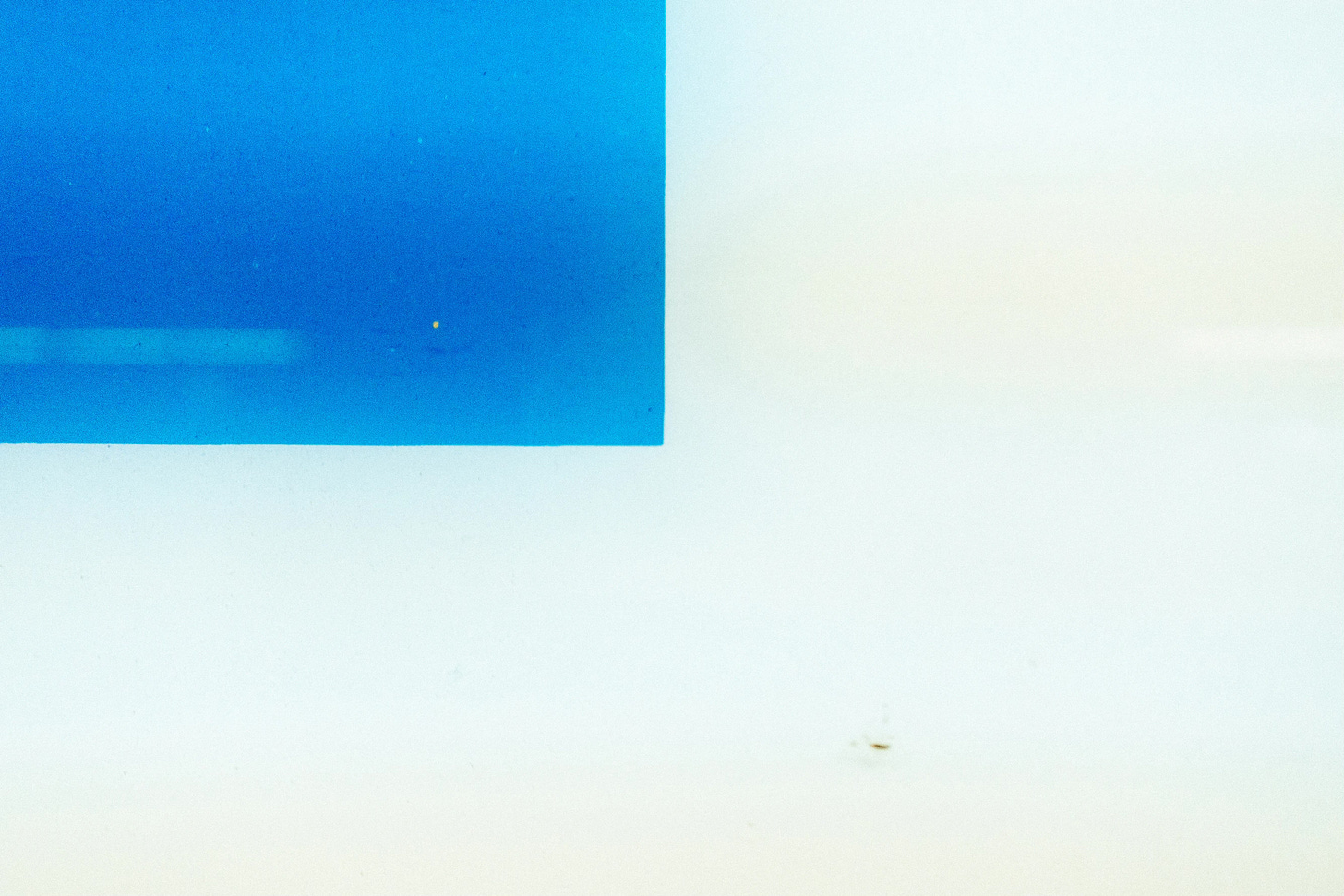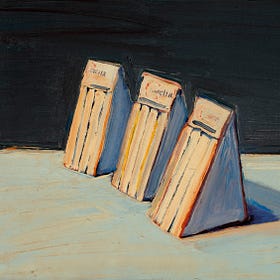Swimming Lessons
A Braided Essay
You can find the Romanian version of this essay in Revista Zugzwang.

I got my first taste of death in a swimming pool. I was five years old. My father enrolled me in a state swimming program he himself had attended and, more impressively, survived. These state programs, though aimed at children, were not your usual day of flapping around in the pool; they were testing grounds for future Olympic athletes, and these were whom the coaches paid attention to, the rest of us losers relegated to the status of obstacles or, at best, misplaced objects. My first day, I entered the shallow end of the pool along with some others, the water coming up to my waist, and I thought I could do it. That I could make my father proud by learning to swim in record time. The coach, a moustached, pot-bellied, bespectacled impression of a retired 70s porn star, blew on his whistle and gave out a series of instructions I had no chance of hearing over the clamour. The lesson had begun. Boys ran, jumped onto their bellies, ducked under the water, while I was frozen in place, not knowing what I should do and scared of disobeying. Then the coach shoved me. And large as I was, for I had always been tall for my age, like a cut down log I fell into the water, back first. I hadn’t had a chance to inhale, so my lungs were empty. Likewise my mind. I could find in myself no drive to lift even a finger. It was as though someone had draped over me a colossal, invisible weighted blanket. I remember lying in that water, my shoulder blades touching the bottom of the pool, my eyes open to the ceiling lights, hearing nothing and seeing only those murky, hazy lights, and wondering if I would die. After some time, the coach pulled me up. I never went back. Years passed before I could step inside a swimming pool again.
The first time I learned to fly was underwater. A classmate of mine from fifth grade, whom I’d met randomly at IAKI, a hotel with a private pool I took to frequenting with my father, taught me the underwater backflip. At school, this boy bullied me, but with my father there, whom all the classmates I’ve ever had for some reason quite liked, he wanted instead to impress me, imagining that was an easy way to get in his good graces. In that same swimming pool I learned that tears hold no power over strangers, when a hard woman my father had hired in a sophomore attempt to teach me how to swim listened as I explained sobbingly that I’d never done more than thirty laps before and replied, ‘Well, now’s as good a time as any.’ This was the first time a complaint of mine had been ignored, the first time I was held accountable for my failures. In three short months, this woman taught me how to not succumb to water. I was not a good student—clumsy, scared, easily discouraged—but she persisted and I learned to survive. Not that I had any other choice. She’d rather have left me to drown than let me leave that pool at the end of summer still a neophyte. This is what I call professional pride.
In a swimming pool I was betrayed for the first time. Summers, my friend Andrei and I had a special place. Right where the strip of seaside we call Mamaia sprouted from the mainland, on the right hand side, there was Perla, a hotel with an outdoor pool, a ping pong table, and delicious spaghetti bolognese. Why did a beach city like ours have so many swimming pools? At Perla Andrei tried convincing me to swim together to the bottom of the pool in search of what he called ‘shiny bits’. I could not do it. Flashbacks of the time I almost drowned got my heart hammering and my lungs cramping up, and somehow, though I held my breath, I imagined the water would find its way into my nostrils and I’d choke and die. So I stayed above the water and pretended I was happy. At first, it was just him and I. We had a lot in common, the two of us, brothers in arms with equal distrust and curiosity for the world of the adults. But likely Andrei wanted someone to share in his passion for diving. One day, he brought another friend of his, and they sank to the bottom as flawlessly as stones and came back up with shiny bits of rock, bits of gravel from who-knows-where, and cat’s eye beads, while I watched, frozen in safety, from above the waterline as they reveled in their quest, two underwater garbagemen in love with their work. Oh, how I wished this kid would disappear, that I’d blink and suddenly it’d be just me and Andrei again. How I wished that I could make him disappear, or warp us someplace else, a safe distance away from him. All that thinking made me hate myself even more. For I was just a little boy with no power.
In swimming pools, I became my father’s friend. My first few years of life, I didn’t see much of my parents. They needed space, they said, to get their lives in order, so early on they shipped me to a grandmother. While they visited often enough, I didn’t always feel like their son. My grandma was both mother and father to me. But when I was ten or so, my father started taking me with him on work trips to Bavaria. That’s when I got to know him. Inbetween conversations on music, business, and world politics, this man who was an irresistible mystery to me let slip bits about himself, and I listened raptly as he told of his life before I was born, and of how rough he’d had it as a young employee in a multinational firm, which was why he’d quit to start his own small automobile business in our port hometown. He complained about his own father, confessing that his greatest objective in life was to be as unlike him as humanly possible. It seems to me that all men, past a certain age, want to stray as far away from our fathers as we can. Perhaps this is a rite of passage, of sorts. We want to become our own men, and the only way we understand to do that is in opposition to the first model of masculinity we learn. That we often fail is quite another matter. We swam a lot in Germany. We tried hotel pools, fancy spas, amusement parks replete with serpentine water slides. My father was content in the water, during explosive dolphin stroke laps and among the quiet bubbling of the jacuzzi. And there, in the not-quite-quietness, I learned how to listen.
At times I fantasise my life will end in water. In such dreams I watch myself swim far out into the ocean, much farther than my flabby, untrained body should be able to, and when I can no longer see further than water I suddenly stop all movement. Then, I wait. Slowly, I begin to sink, the ocean sucking me up like quicksand. A final plunge into the vast unknown. And I see: flurries of fish of all colors, titanic monsters swimming past at speeds undreamed of, beautiful coral reefs, stones in geometrically perfect formation. But the deeper I sink towards the really good stuff, the wonders of the deep that few have seen before, the less reliable my vision. At the end, there’s only darkness. I think about how water is a paradox. How nothing good is ever so good that it can’t be too good. I think about how the murky depths of the sea are such a good metaphor for the world; for life; for me. Because the closer you get to the truth, the harder it is to see it.
P.S. Enjoyed this essay experiment? These might be up your alley too.
Three Pieces
These micro-essays might be a tad darker than the usual fare you’re used to from me, possibly because the summer heat is scrambling my brain, or because I’m deep into Roberto Bolaño’s ominous masterpiece 2666. Still, I hope you enjoy this little experiment.
Bones
Last year at work, several people injured their knees. The first time it happened we were petrified, but by the third it had become a running joke. Our office became the place where knees go to die. Everyone else laughed, while I cringed, caressing my own weak knees. I was afraid of this new kind of plague. But that’s not all. Secretly, I longed to be its next victim.





Lovely essay, really thoughtfully done. It brought to mind an essay I read by David Sedaris called “Memory Laps at the Pool.” You brought us through your own memory laps here so well.
I liked very much your story. When I was a child it was easy for me to learn swimming, but before that I was also able to dive through the swimming pool 😉
Luckily, I had a good relationship with my father. And despite having lost him when I was 10 year old, I have very good memories of him 😊
I agree with your last sentence as you get near the thruth is harder to see it. Maybe because you can't believe it, maybe because somebody make you not to believe...
Thank you very much for this story 😊